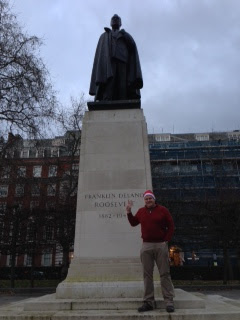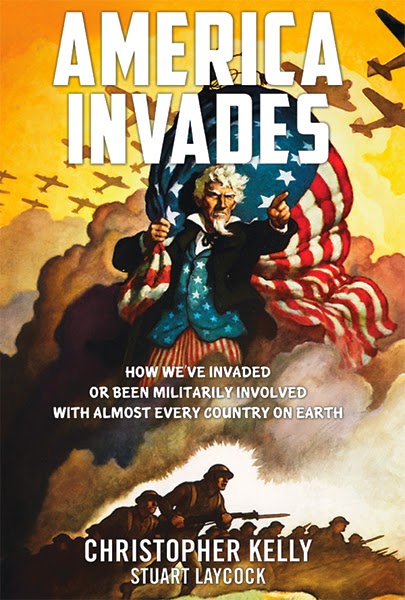 |
| FDR, Did he know? |
This past week marked the 71st anniversary of 12/7/1941 -- Pearl Harbor Day. On that "day of infamy" the Imperial Japanese navy launched an attack on the largest American naval base in the Pacific sinking four battleships, destroying 188 aircraft and killing 2,402 Americans.
In David Niven's autobiography The Moon is a Balloon (see earlier post of the same title,11/26/12, www.amzn.com/0140239243) he relates an interesting exchange he had with Winston Churchill in the autumn of 1941...
"Churchill bade me take another walk in the walled garden. Things were looking grim -- the war in the desert was at its lowest ebb with Rommel snapping a the gates of Alexandria and after their spectacular success in Crete, the possibility of an enemy airborne invasion of the UK had now superseded the threat of a conventional one. Food was getting more and more scarce and a glance at the map sent cold shivers down one's back.
The whole of Europe was under German domination and in Russia, Von Runstedt had just captured 600,000 prisoners at Kiev and Von Bock another 600,000 at Vyazma...Leningrad was besieged and the road to Moscow appeared wide open.
'Do you think, sir,' I asked, 'that the Americans will ever come into the war?'
He fixed me with that rather intimidating gaze and unloosed the famous jaw-jutting bulldog growl.
'Mark my words -- something cataclysmic will occur!'
Four weeks later the Japanese attacked Pearl Harbor.
Months later, when we were once more enjoying the delights of a short leave at Ditchley, I asked in the walled garden if the Prime Minister remembered what he had said so long ago. His reply gave me goose pimples.
'Certainly I remember.'
'What made you say it, sir?'
'Because, young man, I study history.'" Source: The Moon is a Balloon, 1971, David Niven (www.amzn.com/0140239243).
Bletchley Park had been working assiduously since the 1930's on breaking the Japanese codes, as were their counterparts (Magic) in America. In 1937--four years before the pearl Harbor attack-- another student of history, General George S. Patton, who was based in Hawaii at the time, had written "a paper entitled "Surprise," which leading Patton biographer Carlo D'Este called a chillingly accurate prediction of a Japanese attack on Hawaii." In his report Patton wrote, "The unheralded arrival during a period of profound peace of a Japanese expeditionary force within 200 miles of Oahu during darkness; this force to be preceded by submarines who will be in the immediate vicinity of Pearl Harbor...An air attack by navy fighters and carrier borne bombers on air stations and the submarine base using either gas or incendiary bombs."
(Patton: A Genius for War, Carlo D'Este, 1995, www.amzn.com/0060927623).
 |
| FDR, Commander K. and WSC, London Did they know? |
His article is largely based on the claims of Robert Stinnett's book from 2001 called Day of Deceit: The truth about FDR and Pearl Harbor (www.amzn.com/0743201299). Stinnett was a US Navy World War II veteran who argues that Roosevelt had foreknowledge of the Japanese attack. Stinnett was a Oakland Tribune sports photo journalist. He alleges that there were intercepted radio traffic that was decrypted by the allies prior to December 7.
His book's title Day of Deceit is nothing if not ironic (http://en.wikipedia.org/wiki/Day_of_Deceit).
The main problem with his theory is that the Imperial Japanese Fleet maintained strict radio silence on the voyage from Tokyo until it was within striking distance of Pearl Harbor. This is confirmed by US AND Japanese sources. It beggars belief to suppose that after the war the ghost of FDR was somehow able to manipulate the Japanese naval archives to cover up his alleged foreknowledge of he Pearl Harbor attack.
Judith Greer's review of Stinnett's book Dive Bombing FDR in Salon provides a more balanced take...http://www.salon.com/2001/06/14/fdr/ In her article she quotes CIA historian Donald Steury who suggests that Stinnett "concocted this theory pretty much from whole cloth. Those who have been able to check his alleged sources also are unanimous in their condemnation of his methodology. Basically, the author has made up his sources; when he does not make up the source, he lies about what the source says".
Retired historian and cryptographic specialist Robert J. Hanyok wrote in 2008 in the Naval War college review, "The attack on the U.S. Pacific Fleet by the aircraft of the Japanese Striking
Force (Kido Butai) at Pearl Harbor on the morning of 7 December 1941 was
a total surprise to the American commands in Hawaii and Washington (Commander Kelly's italics)." http://www.usnwc.edu/getattachment/218c27dc-ad99-40a4-8d1e-03bee0db32e3/-Catching-the-Fox-Unaware---Japanese-Radio-Denial-. Hanyok writes that, "On 5 November, Admiral Yamamoto issued Combined Fleet Secret Order 1, of which section 4 stipulated that the Striking Force, in accordance with instructions to be detailed by its commander, would maintain strict radio silence from the time of departure from the Inland Sea. Admiral Nagumo reiterated these instructions, adding only the simple stricture “All transmissions of messages are strictly forbidden.”
Hanyok concludes, "In the weeks leading to 7 December, all levels of American naval intelligence unanimously reported to their seniors that the main Japanese carrier
forces were at their bases in Japan." A meeting between Cordell Hull and War Secretary Henry Stimson just three hours before the Pearl Harbor attack, confirmed the American belief that the main IJN carriers were in Japanese home waters.
Stinnett also cites the McCollum memorandum (http://en.wikipedia.org/wiki/McCollum_memo) as evidence that FDR deliberately provoked Japan into attacking the United States. He does this in spite of the fact that there is no evidence that FDR ever saw the Memorandum or ever met Lieutenant Commander McCollum. Moreover, this ignores the context in which US foreign policy was conducted. The US oil embargo and other measures taken towards Japan were, after all, taken in response to Japan's prosecution of a brutal war of conquest against China. An estimated 250,000 to 300,000 Chinese were butchered during the Rape of Nanking in 1937. Japan had also aggressively exploited the fall of France to Hitler in 1940 by occupying the French colony of Vietnam.
America's measured response to Japanese aggression drew Japan fatally away from what could have proven to be a war winning strategy in World War II. Imperial Japan should have negotiated a peace with China and prepared a coordinated strike against its logical ideological enemy -- Stalin's Soviet Union. Had they coordinated their strategy with Hitler's Barbarossa attack in 1941, the Russian port of Vladivostok would have been quickly over-run and the oil resources of Sakhalin island would have been seized. The Siberian divisions that confronted the Germans in December of 1941 would not have been available to defend Moscow. The Soviet Union would have been crushed in a vast strategic pincer movement. Instead they turned disastrously against the USA.
The "FDR Knew in advance" crowd has always had a faint air of racism behind it --"the Japanese could possibly have pulled off operational and strategic surprise simultaneously against the Dutch, British and Americans, could they?" This is reminiscent of the way that American's reacted with disbelief to the news of Custer's massacre at Little Big Horn on June 25, 1876 -- only treachery could explain the defeat of whites at the hands of "savages". Custer's chief mistakes--poor intelligence and an underestimation of the potential enemy--were in play before Pearl Harbor as well.
Why is it that, in spite of mountains of evidence and the counter-testimony of so many respected historians (Andrew Roberts, Anthony Beevor, and John Keegan, to name a few), many people still prefer to subscribe to conspiracy theories such as the "FDR knew in advance" theory? Mainstream military historians are summarily dismissed as being "court historians". It flatters the amour propre of these conspiracy theorists to suppose that they have secret knowledge while other poor slobs are in the dark.
 |
| Commander K. and FDR, Grosvenor Square, London |
On the other hand, FDR advocated cross channel invasions in 1942 and 1942 that would very likely have been disastrous for the Allies. Fortunately, he lost those arguments to Churchill and the British General staff. He was excessively paranoid about DeGaulle, Churchill and the British Empire, but insufficiently paranoid about Stalin.
FDR may have been vain, arrogant and a faithless husband, but he did lead the USA to victory against the greatest tyranny in the history of mankind. Let's also not forget that he also serves credit for eliminating Prohibition. FDR’s favorite drink was a cocktail he called a “Haitian Libation”: rum, brown sugar, egg whites and orange juice. He also enjoyed mixing martinis for friends.
Commander Kelly say, "Raise a glass to toast FDR this December! If you get a chance visit the wreck of the USS Arizona in Hawaii which continues to "weep" its 'tears" of oil every day over seventy years on. Remember Pearl Harbor and all who served!*"
* Historian Steven M. Gillon in his recent book Pearl Harbor: FDR Leads the Nation into War, 2011 (www.amzn.com/046503179X) writes, "The 'back door' theory, like most conspiracy theories, fails the test of logic. It assumes that the President of the United States, along with Secretary of State Cordell Hull, Secretary of War Henry Stimson, Secretary of the Navy Frank Knox, Army Chief of Staff George Marshall, an Chief of Naval Operations Admiral Harold Stark, knowingly risked the lives of thousands of servicemen in pursuit of a policy option that could easily have been achieved by other, less costly means. Roosevelt did not need to sacrifice his Pacific Fleet to inflame public opinion. the nation would have been aroused to fight had the commanders been fully prepared and the damage less extensive. Also, it was by no means clear that the Japanese attack on an American military base in Hawaii would have allowed FDR to lead the nation into the European war. Had Hitler not declared war on the United States, FDR would likely have been forced to focus all of America's resources on defeating Japan, leaving Britain to fend for itself against Germany. Although if defies the rules of common sense and lacks evidence, the 'back door' theory refuses to go away."
You can order Commander Kelly's first book, America Invades, here...www.americainvades.com or on Amazon...www.amzn.com/1940598427

3 comments:
The idea that FDR, who loved the US Navy all his life, would have allowed the Japanese to attack it without warning it is simply ludicrous. The American casus bellum would have been just as strong if the Japanese attack had been defeated at Pearl Harbor, after all.
Thanks Andrew. Excellent point.
Excellent article! I read the book mentioned here long ago and was very baffled by the conclusions drawn by the author in light of all that was known. Did we know something was afoot? Yes, of course. But all intelligence sources pointed to the fact that the Kido Butai was heading south, not east. The Japanese did a very good job of deceiving the intelligence departments and did indeed maintain a very strict regimen of radio silence during the approach to Pearl. I have always found the assertion that FDR knew, and allowed the attack on Pearl, to be nothing more than mendacious slander against a fine President.
Post a Comment